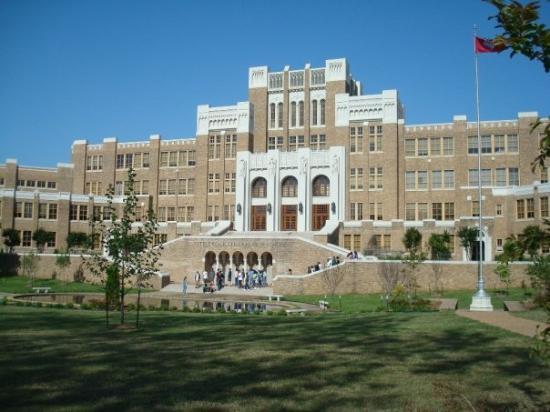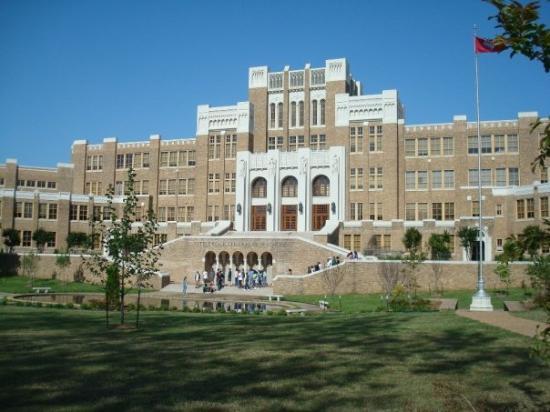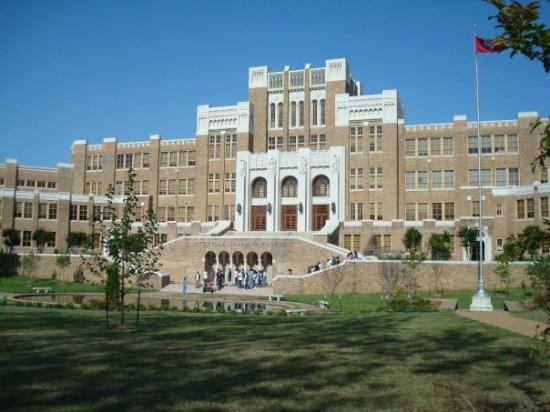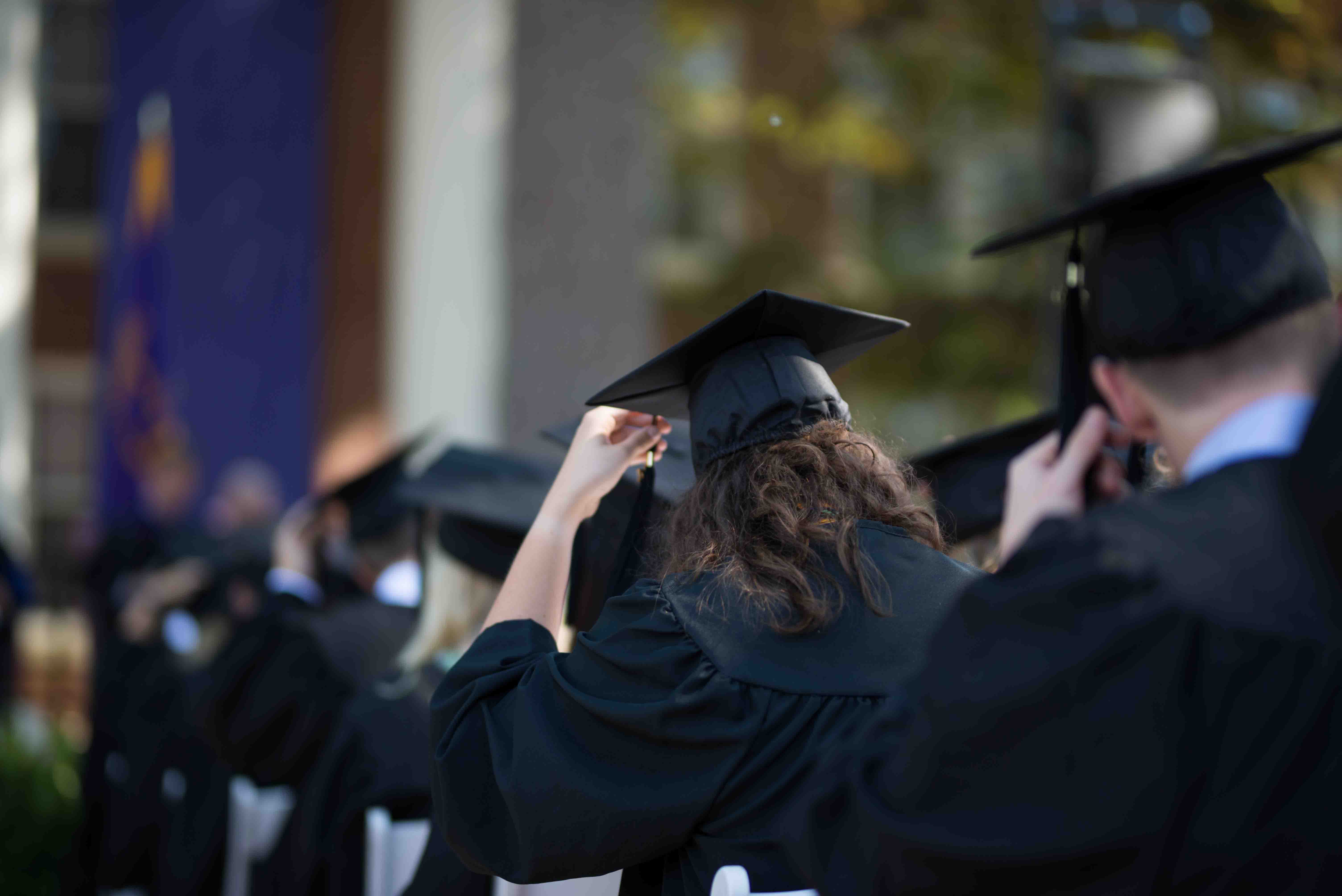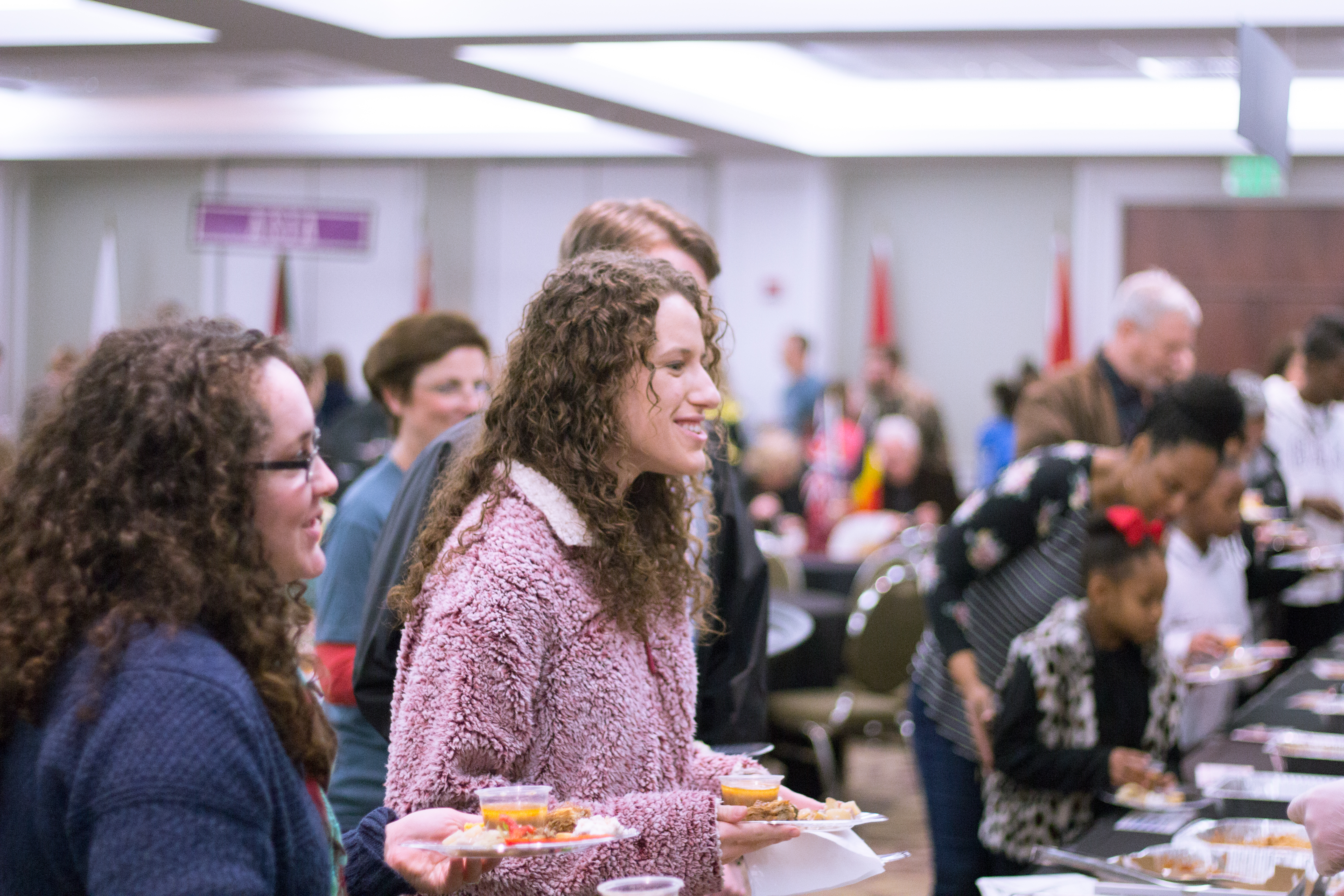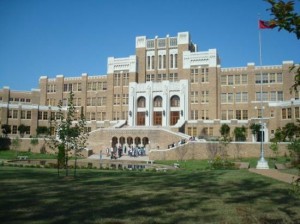 Desegregation: An Honors Seminar
Desegregation: An Honors Seminar
Part 2 of 5
Fifteen honors students contemplated the desegregation of public schools through research on the movement’s early days and trips to key sites in the history of the Civil Rights Movement. The students visited the museum and toured the school at the Little Rock Central High School National Historic Site. Having just read Melba Beals’ Warriors Don’t Cry, the students saw the exterior of the building, where African-American students were initially denied entrance, as well as the cafeteria, hallways and auditorium where the Little Rock Nine persevered through the integration of Central High in 1957.
The honors students researched desegregation in their home towns or in nearby areas and produced portfolios detailing their findings. They also viewed the documentary Hoxie: The First Stand and read Black Like Me, by John Howard Griffin. The one-hour seminar concluded with a trip to the National Civil Rights Museum in Memphis.
In an earlier essay assignment, students were asked to reflect on their visit to Little Rock and on the book by Beals, one of African-American students who integrated Central High amid turmoil and national news coverage in 1957. Five of those reflection papers are listed here. The authors are: Sarah Greeson, a senior from Hot Springs; Jesse Pruett, a senior from Harrison; Kiley Gamble, a junior from McKinney, Texas; Michelle Wasmund, a freshman from Dennison, Texas; and Anna Wakeling, a freshman from Bryant.
Others students in the seminar were: T.J. Bailey, a sophomore from Ft. Smith; Kimberly Carlton, a senior from Brandon, Miss.; Kasa Cooper, a senior from Paragould; Ethan Day, a sophomore from Garland, Texas; Anthony Emerson, a sophomore from Fresno, Texas; Jacob Lively, a senior from Queen City, Texas; Nate Peace, a junior from Bedford, Texas; Jessica Reid, a sophomore from Grandview, Texas; Nolan West, a senior from Bolivar, Missouri; and Clark Whitney, a freshman from Searcy. The course was taught by Dr. Kevin Motl, assistant professor of history, and Dr. Jeff Root, professor of communications and dean of the school of humanities.
Pride
by Michelle Wasmund
In her book, Warriors Don’t Cry, Melba Pattillo Beals said that she was “Proud that [she] lived in a country that would go this far to bring justice to a Little Rock girl like [her], but sad that they had to go to such lengths.” (p.95) Her mixed feelings of pride and sadness for her country shouldn’t have to go to hand in hand, but the context of the time period made it so. The ideologies of racism, segregation, and desegregation influence that pride and sadness Melba refers to. As the book progresses and history has revealed, we are shown both sides of Melba’s juxtaposing feelings towards her surroundings.
There were so many extreme viewpoints back during the time of integration; it makes me proud that the Little Rock Nine were steadfast in their belief of integration. But pride is a funny thing, good or bad. I’m not sure how I can exactly have pride for those nine brave boys and girls; I think it comes with the territory of being an American. We see history through filtered eyes, but this is one instance in the course of time that you can’t miss. When you really think about it, in elementary and even high school history textbooks portray the USA as grand, doing no wrong. We even turned almost wiping out a culture and race of people into a triumph. It’s hard to distinguish the true good and bad from what we’ve been taught. The struggle for integration and equality is one of the points in history where the vast majority of open minded people, not accounting for the extremists, can see the truth for themselves. The real courage and perseverance I saw in the Nine, at the museum and through the words in Melba’s book, was inspiring. The pride of the free, the pride of the new integrated America is instilled in the readers and those who go to the museum. They gallivantly struggled each day to just survive in the walls of Central High, showing the world that integration was worth it. We can see the effects in our lives every day, and how the world is better for it.
I went to a youth gathering a few summers ago, and part of the program was that we had to go to a few workshops. One that made a big impact to me dealt with privilege and oppression. We had to do an activity were we all held hands and the person in charge read things to us, and if they applied, we stepped forward or backwards, depending on what he said. Things like “if a family member has been in jail, step back” or “if a family member has a master’s degree or is a doctor of some kind, step forward” and in the end, some people had to let go of hands, but the awesome thing was that they didn’t want to let go. They wanted those people left behind to be right up there with them, with the privileged ones who got to move forward, and not backwards. This showed me that we don’t want people to be left in the dust, there is something in everyone that makes them want to help others. I saw this in little and big ways in Central High, which made this part of history even more real to me. Those people like the vice principal who tried to help the Nine out during the first part of their year at Central, but who in the end faltered in her duty to help all of the students and Link, who saved Melba’s life more than once by telling her about the segregationists’ plans for her personally. Even the students who didn’t bully them, who gave them a smile in the hallways, made a difference. Those people I believe really did want them to succeed. Urging them on in the ways they knew best, how small or great their part was did make a difference. It’s those few that stand out in the crowd who inspire something greater than them. Even Hazel Massery, whom we read about briefly in the museum, came around. One known tormentor of Elizabeth Eckford realized she was in the wrong. Regardless of her intentions for better publicity, or a shot at the spotlight, good came out of Hazel. That realization that came 30 years later, I believe is part of the reason why the Little Rock Nine did what they did. So that years from then, decades and even centuries, people would realize and learn from what happened. The Nine did it for the betterment of the country, for their people as a united race. People will look back and see what they did, see how it impacted those then and those now, and see the truth in why it was necessary.
One aspect that struck me about pride was the brutality of the segregationists. The mindset they were stuck in, and had been stuck in for centuries of white superiority was prevalent just 50 years ago. Their pride in being white, the upper class, the “better” race, causes me some shame. The mocking, violence, name-calling and threats were normal for them. It didn’t seem out of place to harass an innocent bystander, if they were colored. There was no safe haven in Central High, not even the girls’ restroom. Corners were a scary place there, because Melba or one of the other eight could get backed into one and been brutalized. I see the sadness Melba was referring to in her quote, sadness for those who didn’t stand up for them, because they didn’t want to get harassed themselves; sadness for the segregationists who couldn’t see past their pride and fear for the unknown. Even briefly walking through the halls you could catch a glimpse of how Central High still is “segregated” in some ways, like who sits where at the lunch tables and groups that cling together in the hallways. The tour guide even mentioned who rides the bus home, and who parks in a parking lot. Part of the experience of going to Central High was realizing how far we have come in 50 years, but then again realizing how far we still have to go.
Another section of that pride dealt with not being open-minded. The fact that the Arkansas National Guard, a symbol of hope and security, was being used to barricade the Nine from entering is astounding. The governor was so set in his ways that he used military force to enforce segregation. He couldn’t fathom the idea that blacks and whites could thrive in an educational environment together. His close-mindedness prevented him from doing a truly great thing. His pride kept the nation from moving forward sooner than it needed to. One good thing that came out from the governor’s pride was that the national government was for desegregation. And the national government was willing to do whatever possible to enforce those ideals that blacks and whites were equal, especially equal enough to have the same opportunities so that they all could succeed. The 101st Airborne troops were incredible in their roles. I think if the people of Little Rock had taken the same mindset, that it was inevitable that desegregation was going to happen, so we should embrace it. They were the sole protectors in that school. When the administration, the teachers, and especially the students failed in believing in them and protecting them, the 101st were there. The 101st were there on order from the president, but they went above and beyond their call of duty, by advancing the war on segregation.
Melba said that her experience at Central High “taught [her] that we are not separate. The effort to separate ourselves whether by race, creed, color, religion, or status is as costly to the separator as to those who would be separated.” As I look back through history, through what happened at Central High, and especially today, I can see how dependent we are on each other. How through learning about our past puts us in our place, to push aside our pride for who we are, and put forth our pride for our country and who we are as the human race.

